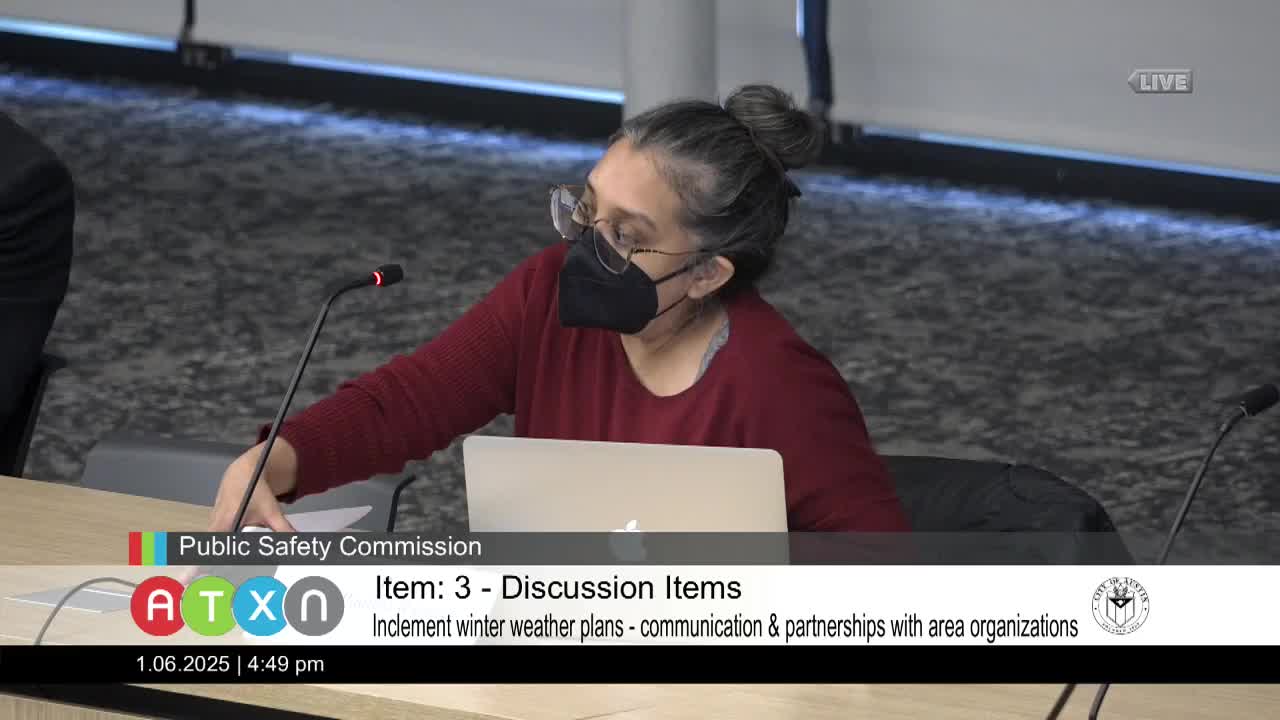City revises cold-weather shelter threshold to 35'F; central intake and language access emphasized
Get AI-powered insights, summaries, and transcripts
Subscribe
Summary
Bill Wilson, interim director in Austin's Office of Homeland Security and Emergency Management, said the city simplified its cold-weather shelter trigger and emphasized centralized intake, free CapMetro transport and multilingual alerts.
Bill Wilson, interim director of the City of Austin Office of Homeland Security and Emergency Management, told the Public Safety Commission the city revised its cold-weather activation threshold and is emphasizing centralized intake, transport and multilingual outreach for winter events.
"So we thought it was much easier just to go ahead and make the decision that we're gonna activate it 35 degrees or or colder," Wilson said, describing the city's updated activation rule and the rationale to simplify criteria publicly.
Wilson said the city's cold-weather intake remains centralized at 1 Texas Center. During activations the city partners with CapMetro to provide free transportation to the intake site; the Homeless Strategy Office contracts an initial vendor to shelter the first 300 people and the city staffs and supplies operations if demand exceeds that level. Wilson said mission-ready packages ' storage containers pre-stocked with about 72 hours of food, water, blankets and essentials ' reduce distribution delays in icy conditions.
The presentation outlined distinctions among winter shelters (targeting people experiencing homelessness when weather alone creates risk), winter shelter plans (broader shelter needs when weather impacts city infrastructure) and warming centers (city facilities kept open for residents to warm up during business hours and, when necessary, extended hours). Wilson said parks and recreation-owned sites are often preferred because the city controls use of those facilities.
Wilson described public information resources: the city's winter-shelter and alert content is listed at austintexas.gov/alerts and the city encourages signing up for WarnCentralTexas.org to receive address-targeted emergency messages. The city said it posts shelter and warming-center hours in 14 languages on the alerts site and contracts American Sign Language services for urgent material.
Wilson discussed operational preparations across departments: Transportation and Public Works rehearsed routes and signal operations; Austin Energy conducted incident command exercises and ordered de-icing materials; Austin Public Libraries identified potential extended-hours warming centers; and Parks and Recreation coordinated facilities and mission-ready packages. He said the city also conducts public-information tabletop exercises to streamline news-flash and mayor/council communications during events.
Commissioners pressed for outreach data to people experiencing homelessness and accessibility for seniors and people with disabilities. Wilson said the Homeless Strategy Office maintains a list of individuals for outreach and teams make on-the-ground contact rather than relying solely on digital alerts; he said the city is working to expand multiple embarkation points for intake and is exploring memorandums of understanding with Austin Independent School District for facilities available 24/7 in prolonged incidents.
Wilson said the city coordinates with Travis County Office of Emergency Management, shares WarnCentralTexas instances and holds annual joint winter-weather tabletops with the county.
Ending
Officials said the cold-weather shelter was activated the night before the meeting, check-in was available at 1 Texas Center from 6 to 8 p.m. and a shelter hotline number was posted; city staff asked media and partners to push the transportation and shelter hotline details during the activation.
